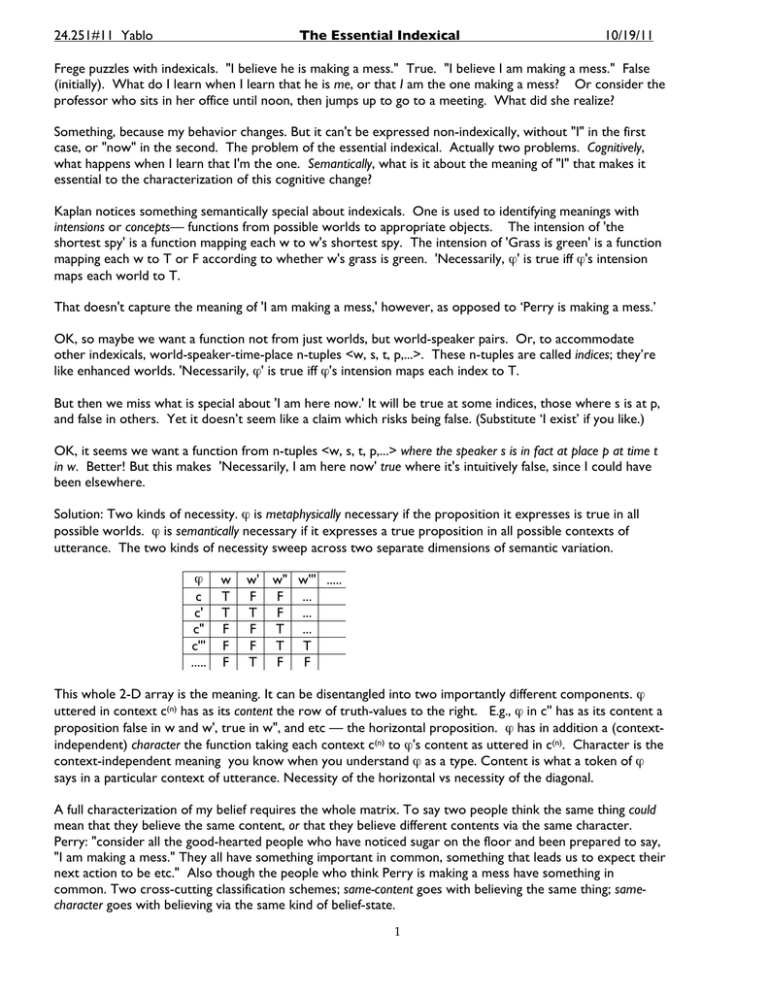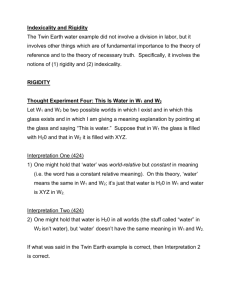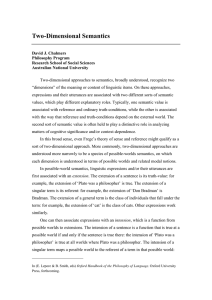24.251#11 Yablo 10/19/11 The Essential Indexical
advertisement

The Essential Indexical 24.251#11 Yablo 10/19/11 Frege puzzles with indexicals. "I believe he is making a mess." True. "I believe I am making a mess." False (initially). What do I learn when I learn that he is me, or that I am the one making a mess? Or consider the professor who sits in her office until noon, then jumps up to go to a meeting. What did she realize? Something, because my behavior changes. But it can't be expressed non-indexically, without "I" in the first case, or "now" in the second. The problem of the essential indexical. Actually two problems. Cognitively, what happens when I learn that I'm the one. Semantically, what is it about the meaning of "I" that makes it essential to the characterization of this cognitive change? Kaplan notices something semantically special about indexicals. One is used to identifying meanings with intensions or concepts–– functions from possible worlds to appropriate objects. The intension of 'the shortest spy' is a function mapping each w to w's shortest spy. The intension of 'Grass is green' is a function mapping each w to T or F according to whether w's grass is green. 'Necessarily, ϕ' is true iff ϕ's intension maps each world to T. That doesn't capture the meaning of 'I am making a mess,' however, as opposed to ‘Perry is making a mess.’ OK, so maybe we want a function not from just worlds, but world-speaker pairs. Or, to accommodate other indexicals, world-speaker-time-place n-tuples <w, s, t, p,...>. These n-tuples are called indices; they’re like enhanced worlds. 'Necessarily, ϕ' is true iff ϕ's intension maps each index to T. But then we miss what is special about 'I am here now.' It will be true at some indices, those where s is at p, and false in others. Yet it doesn’t seem like a claim which risks being false. (Substitute ‘I exist’ if you like.) OK, it seems we want a function from n-tuples <w, s, t, p,...> where the speaker s is in fact at place p at time t in w. Better! But this makes 'Necessarily, I am here now' true where it's intuitively false, since I could have been elsewhere. Solution: Two kinds of necessity. ϕ is metaphysically necessary if the proposition it expresses is true in all possible worlds. ϕ is semantically necessary if it expresses a true proposition in all possible contexts of utterance. The two kinds of necessity sweep across two separate dimensions of semantic variation. ϕ c c' c" c''' ..... w T T F F F w' w" w''' ..... F F ... T F ... F T ... F T T T F F This whole 2-D array is the meaning. It can be disentangled into two importantly different components. ϕ uttered in context c(n) has as its content the row of truth-values to the right. E.g., ϕ in c'' has as its content a proposition false in w and w', true in w", and etc –– the horizontal proposition. ϕ has in addition a (contextindependent) character the function taking each context c(n) to ϕ's content as uttered in c(n). Character is the context-independent meaning you know when you understand ϕ as a type. Content is what a token of ϕ says in a particular context of utterance. Necessity of the horizontal vs necessity of the diagonal. A full characterization of my belief requires the whole matrix. To say two people think the same thing could mean that they believe the same content, or that they believe different contents via the same character. Perry: "consider all the good-hearted people who have noticed sugar on the floor and been prepared to say, "I am making a mess." They all have something important in common, something that leads us to expect their next action to be etc." Also though the people who think Perry is making a mess have something in common. Two cross-cutting classification schemes; same-content goes with believing the same thing; samecharacter goes with believing via the same kind of belief-state. 1 MIT OpenCourseWare http://ocw.mit.edu 24.251 Introduction to Philosophy of Language Fall 2011 For information about citing these materials or our Terms of Use, visit: http://ocw.mit.edu/terms.






